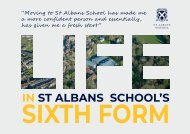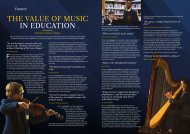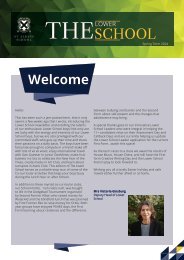Create successful ePaper yourself
Turn your PDF publications into a flip-book with our unique Google optimized e-Paper software.
Religion<br />
47<br />
Putney Debates – October 1647<br />
I<br />
n a small ordinary Church, St Mary’s<br />
at Putney, on the North bank of the<br />
Thames about 6 miles out of London,<br />
a series of debates took place in October<br />
1647 which would profoundly influence<br />
the development of ideas in Britain and<br />
across the world for centuries to come. In<br />
those debates, ideas were articulated<br />
which, whilst sounding commonplace today,<br />
were then radical and extraordinary.<br />
By the summer of 1647, the Roundheads<br />
were winning the English civil war. At<br />
Marston Moor and Naseby, Oliver Cromwell's<br />
New Model Army had crushed the<br />
Cavaliers and King Charles I himself was<br />
a prisoner. <strong>The</strong><br />
Civil War had<br />
been brutal and<br />
bloody – proportionally,<br />
the<br />
death toll was<br />
greater than the<br />
First and Second<br />
World Wars<br />
combined. But<br />
the approaching<br />
end of the war<br />
fostered a new<br />
fear among ordinary<br />
soldiers - t<br />
hat Parliament<br />
and the army<br />
generals (or<br />
"grandees") were<br />
preparing to sell<br />
them out. Some<br />
MPs, fearing the<br />
army and keen for a settlement with the<br />
King, wanted to cut soldiers' pay, disband<br />
regiments, refuse indemnity for war damage<br />
and pack them off to Ireland. In many<br />
regiments, ‘agitators’ sprang up who f<br />
ought back against these proposals - "We<br />
were not a mere mercenary army hired to<br />
serve any arbitrary power of a state, but<br />
called forth ... to the defence of the<br />
people's just right and liberties," said agitator<br />
pamphlets circulating in the Summer<br />
of 1647. For the first time, those who and<br />
fought and suffered in a struggle demanded<br />
some kind of recompense –<br />
maybe political, maybe financial. <strong>The</strong><br />
sense that the elite would settle back into<br />
the cosy status quo which had been preserved<br />
through blood and toil was a powerful<br />
theme of the pamphlets and petitions<br />
which flooded the Army in the summer of<br />
1647.<br />
<strong>The</strong> grievances of the soldiers were taken<br />
up by groups of radical thinkers, known<br />
as Levellers, both inside and outside the<br />
Army. Originally coming out of<br />
churches in London in the mid-<br />
1640s, the Levellers are often considered<br />
to be the first “communists", declaring<br />
that all degrees of men should be “levelled,<br />
and an equality should be established".<br />
Identified by their green scarves<br />
and ribbons, the Levellers put forward a<br />
post war manifesto entitled the<br />
Battle of Edgehill,<br />
October 1642


















